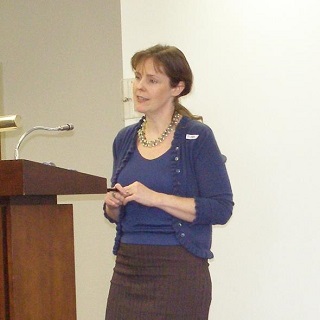Philosophy: where are all the women?

Why is it that in Philosophy, where first year undergraduate cohorts have a relatively even gender split, that there are so few female academics in the discipline?
Why is the ratio of female to male academics in philosophy worse than in physics?
These questions and more will be the topics of discussion at a conference being held at the School of Philosophy today.
The conference brings together authors who contributed to the soon to be released book: Women in Philosophy: What Needs to Change?, edited by Dr Katrina Hutchinson and head of the ANU Gender Institute Dr Fiona Jenkins.

Dr Fiona Jenkins
The idea of the book, says Dr Jenkins, was to ask women to document their own experiences in the profession to determine the underlying causes and suggest ways to fix the gender gap. The chapters in the book look at a number of issues: from the impact of implicit gender-based stereotypes and biases across philosophy as a whole, to institutional issues, to the way that philosophy is taught from a first-year level.
The book contains 12 contributions from authors in Australia, New Zealand, UK, US and Canada; countries which face similar levels of unequal gender representation in the field.
“One of the underlying problems is that there’s an assumption that women don’t want to do philosophy because it’s just too hard,” says Dr Jenkins.
Another question raised by the gender imbalance: how does the male domination of the field affect the discipline of philosophy as a whole?
Dr Jenkins says that that while men dominate the profession, so too do their philosophical interests.
“For women who may have different research interests, they either need to fit in with these masculine dominated areas or accept a marginal status – it’s a real dilemma.”
The problems with the discipline are international and systemic in scope, and will be difficult to change. With top philosophy schools around the world maintaining high rankings despite the gap, there’s not much incentive to change either, says Dr Jenkins.
Over the last year, five female graduates have been appointed to prestigious postdoctoral and lecturing appointments overseas, and Dr Rachael Briggs was recently recognised as one of philosophy’s rising stars. However, even at ANU, only approximately 10% of our PhD students in philosophy are currently female, says Dr Jenkins.
Susan Pennings, a second year PhD candidate at the School, says that in her experience so far, everyone at ANU has been very supportive, and she personally hasn’t felt much of the gender gap. Her research is looking at health and social justice from an ethics and political theory perspective.
Susan says that she would eventually like to work in academia, so has keen interest in the outcomes of the conference and how this might help her carve out her own academic path.